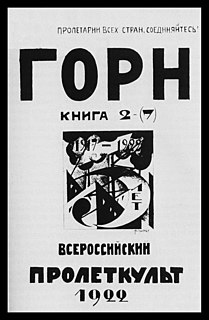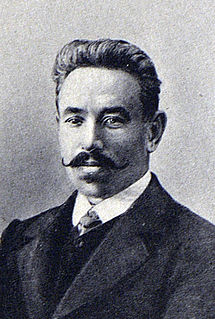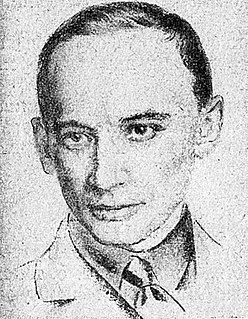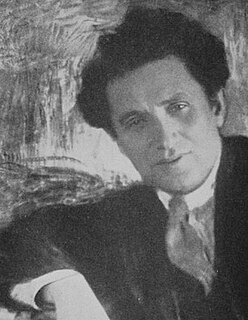
The Bolsheviks, also known in English as the Bolshevists, were a radical, far-left, and revolutionary Marxist faction founded by Vladimir Lenin and Alexander Bogdanov that split from the Menshevik faction of the Marxist Russian Social Democratic Labour Party (RSDLP), a revolutionary socialist political party formed in 1898, at its Second Party Congress in 1903.
The history of the Communist Party of the Soviet Union was generally perceived as covering that of the Bolshevik faction of the Russian Social Democratic Labour Party from which it evolved. The date 1912 is often identified as the time of the formation of the Communist Party of the Soviet Union as a distinct party, and its history since then can roughly be divided into the following periods:

Proletkult, a portmanteau of the Russian words "proletarskaya kultura", was an experimental Soviet artistic institution that arose in conjunction with the Russian Revolution of 1917. This organization, a federation of local cultural societies and avant-garde artists, was most prominent in the visual, literary, and dramatic fields. Proletkult aspired to radically modify existing artistic forms by creating a new, revolutionary working-class aesthetic, which drew its inspiration from the construction of modern industrial society in backward, agrarian Russia.

Matvei Konstantinovich Muranov was a Ukrainian Bolshevik revolutionary, Soviet politician and statesman.
Yedinstvo or Edinstvo was a faction within the Russian Social Democratic Labor Party (RSDLP) between 1914 and 1917 and then a small independent party in 1917 and 1918. It was led by Georgi Plekhanov.

Ivan Ivanovich Skvortsov-Stepanov was a prominent Russian Bolshevik revolutionary and politician. Skvortsov-Stepanov was one of the oldest participants in the Russian revolutionary movement as well as a Marxist writer, historian and journalist.
Vpered was a subfaction within the Russian Social Democratic Labour Party (RSDLP). Although Vpered emerged from the Bolshevik wing of the party, it was critical of Lenin. The group was gathered by Alexander Bogdanov in December 1909 and was active until 1912. Other notable members of the group included Maxim Gorky, Anatoly Lunacharsky, Mikhail Pokrovsky, Virgil Shantser, Grigory Aleksinsky, Stanislav Volski, and Martyn Liadov.

The 3rd Congress of the Russian Social Democratic Labour Party was held during 25 April - 10 May [(12–27 April O.S.)] 1905 in London, UK.

The 1907 Tiflis Bank Robbery, also known as the Erivansky Square expropriation, was an armed robbery on 26 June 1907 in the city of Tiflis in the Tiflis Governorate in the Caucasus Viceroyalty of the Russian Empire. A bank cash shipment was stolen by Bolsheviks to fund their revolutionary activities. The robbers attacked a bank stagecoach, and the surrounding police and soldiers, using bombs and guns while the stagecoach was transporting money through Erivansky Square between the post office and the Tiflis branch of the State Bank of the Russian Empire. The attack killed forty people and injured fifty others, according to official archive documents. The robbers escaped with 241,000 rubles.

Gleb Ivanovich Bokii was a Ukrainian Communist political activist, revolutionary, and paranormal investigator in the Russian Empire. Following the October Revolution of 1917, Bokii became a leading member of the Cheka, the first Soviet secret police, and later of the OGPU and NKVD.
Pravda is a Russian broadsheet newspaper, formerly the official newspaper of the Communist Party of the Soviet Union, when it was one of the most influential papers in the country with a circulation of 11 million. The newspaper began publication on 5 May 1912 in the Russian Empire, but was already extant abroad in January 1911. It emerged as a leading newspaper of the Soviet Union after the October Revolution. The newspaper was an organ of the Central Committee of the CPSU between 1912 and 1991.

Alexander Aleksandrovich Bogdanov, born Alexander Malinovsky, was a Russian and later Soviet physician, philosopher, science fiction writer, and Bolshevik revolutionary.

Grigory Yevseyevich Zinoviev, known also under the name Ovsei-Gershon Aronovich Radomyslsky, was a Russian revolutionary and politician. He was an Old Bolshevik and a close associate of Vladimir Lenin. During the 1920s, Zinoviev was one of the most influential figures in the Soviet leadership and the chairman of the Communist International.

Lev Borisovich Kamenev was a Bolshevik revolutionary and a prominent Soviet politician.

Alexei Ivanovich Rykov was a Russian Bolshevik revolutionary and a Soviet politician most prominent as Premier of Russia and the Soviet Union from 1924 to 1929 and 1924 to 1930 respectively. He was one of the accused in Joseph Stalin's show trials during the Great Purge.

The Mensheviks, also known as the Minority were one of the three dominant factions in the Russian socialist movement, the others being the Bolsheviks and Socialist Revolutionaries.

The Russian communist revolutionary and politician Vladimir Lenin began his active revolutionary activity in 1892, and continued till assuming power in the Russian Revolution of 1917. Following on from his early life, during which he had become devoted to the cause of revolution against the Tsarist regime in the Russian Empire and converted to Marxism, Lenin moved to St. Petersburg. There he joined a revolutionary cell, and became a vocal advocate for Marxism within the revolutionary socialist movement. Entering a relationship with fellow Marxist Nadezhda Krupskaya, he toured Western Europe to build ties with other Russian revolutionary emigres and learn more about the international Marxist movement. Upon returning to Russia, he was arrested for sedition in 1895 and exiled to Shushenskoye in the Minusinsky District of eastern Siberia for three years. There, he devoted his time to translating and writing revolutionary texts, marrying Krupskaya in July 1898.

The Russian Social Democratic Labour Party, also known as the Russian Social Democratic Workers' Party or the Russian Social Democratic Party, was a revolutionary socialist political party founded in Minsk, Belarus.
The first conference of the Russian Social Democratic Labour Party (RSDLP) took place in Tampere (Tammerfors), Grand Duchy of Finland, in December 1905. Held between the 1905 London and 1906 Stockholm party congresses at the Tampere Workers' Hall, the conference was an unofficial meeting of the Bolshevik faction of the party. It is particularly remembered for playing host to the first meeting of Vladimir Lenin and Joseph Stalin. The conference resolved to forgo participation in the new State Duma and its associated elections, and instead begin an armed uprising against the government of the Russian Empire, a move that eventually led to the October Revolution of 1917.
Virgil Leonovich Shantser was a Bolshevik revolutionary active in the Moscow uprising of 1905. He became a leading Bolshevik, but followed Alexander Bogdanov into the Vpered faction in 1909. However he contracted an illness and died in 1911.













